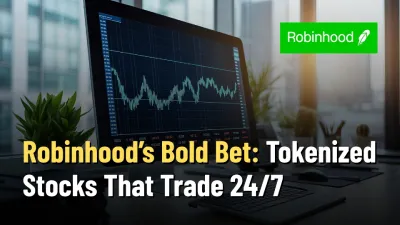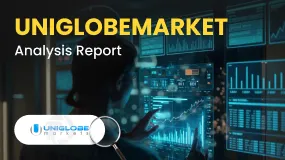Robinhood’s Bold Bet: Tokenized Stocks That Trade 24/7
Robinhood is reinventing stock trading with tokenized, 24/7 equities on the blockchain—ending settlement delays and redefining how markets move.
简体中文
繁體中文
English
Pусский
日本語
ภาษาไทย
Tiếng Việt
Bahasa Indonesia
Español
हिन्दी
Filippiiniläinen
Français
Deutsch
Português
Türkçe
한국어
العربية
Abstract:The ongoing conflict between Thailand and Cambodia has put immense pressure on the Thai Baht, impacting the forex market and investor sentiment. Read on for more.

It‘s July 2025, and Southeast Asia finds itself in the eye of a storm. What started as small-scale unrest along the Thailand-Cambodia border spiraled quickly into some of the fiercest fighting the region has seen in decades. Artillery shells have fallen, families have fled their homes, and diplomatic phones haven’t stopped ringing since. While the worlds attention is fixed on the humanitarian crisis, markets are telling their own story. The Thai baht—already wobbling from global economic jitters and political unease—has been thrown into turmoil, with investors suddenly scrambling to gauge how long the storm will last and just how deep it will go.
This conflict isn‘t just another blip on the radar; it’s the deadliest episode between Thailand and Cambodia in a generation. Since July 24, more than 34 people have lost their lives, and over 200,000 have been forced to leave everything behind as fighting rages around long-disputed borderlands—among them, ancient temple sites like Preah Vihear that have long been flashpoints.
World powers arent sitting on the sidelines. The U.S. and China have both urged calm, but the situation escalated further when U.S. President Donald Trump froze trade talks with both Thailand and Cambodia, hammering home the seriousness of the conflict. As leaders sat down in Malaysia to grope for common ground, the shelling continued—a reminder that the path to peace is as treacherous as the war itself.
Just weeks ago, the Thai baht was in rare form, posting gains of more than 6% for the year. Optimism was everywhere: trade deals looked promising, foreign money was pouring into Thai stocks, and rising gold prices kept Bangkoks financial heart beating strong. In late July, the baht even soared to 32.11 per U.S. dollar—the strongest it had been in over three years.
Then came the sound of artillery—and the mood flipped overnight. The baht slipped 0.3%, to 32.29 per dollar, as nervous traders locked in profits and braced for the unknown. Currency experts chalked up the slide to spiraling geopolitical risk. When danger feels close, confidence dries up, and cash tends to flow out, not in. Add to that the usual headaches—trade wars, unpredictable politics—and you have a recipe for a currency headache. Thailands central bank, ever vigilant, announced it would step in if “excessive volatility” struck.

The baht isnt just feeling the heat from border bullets. Other headwinds make the situation even trickier:
Analysts at KResearch don‘t see an easy rebound. If things don’t improve, they estimate the baht could dip to 35.50 per U.S. dollar by years end.
With gunfire blazing, all seven official border crossings have slammed shut. Thats put a freeze on roughly $1.2 1.2billion in annual trade—particularly in essential goods like fuel and farm produce. Transport firms say costs have soared 30% as cargo must now travel the long way around, with delays and missed deliveries piling up.
Industry leaders are sounding alarms. Should peace talks stall, the Federation of Thai Industries warns border trade alone could shrink by 60billion baht, about 1.8–2% of Thailands total border commerce. Tourism—so vital for jobs and growth—is also on shaky ground as airlines cancel flights and embassies urge travelers to steer clear.
Currency woes and closed borders are making for nerves of steel on the Thai stock exchange. International investors, once charmed by Thailands resilience, are quietly retreating, trimming their positions and seeking safer shores. Property prices, too, face uncertainty, as risks of physical damage and higher insurance weigh on the market.
Thailand‘s central bank is poised to keep its policy rate at 2.25%, trying to strike just the right balance: support the economy, keep inflation in check, and be ready for anything. Policymakers won’t hesitate to monitor capital flows and intervene to cool down any panic.
Financial voices note that while the currencys current weakness grabs headlines, past resilience—thanks to tourism and gold trading—could eventually anchor the baht if conditions stabilize. But if violence or political wrangling gets worse, all bets are off.
Not everything depends on the border‘s gunfire. Moves by the U.S. Federal Reserve (like interest rate cuts) have a big say in how emerging market currencies fare. Meanwhile, President Trump’s stated preference for a weaker dollar throws yet another wild card into the mix.
Consensus now points toward a rocky road ahead, with the baht likely bouncing between uncertainty and further depreciation. Should the crisis escalate or spook investors en masse, it could easily breach the 35 THB/USD mark.
The recent clash between Thailand and Cambodia is a stark reminder of how quickly geopolitical tremors can shake financial foundations. Overnight, investor sentiment has gone from bullish to wary, with the baht serving as a pulse check for a region standing at a crossroads. For Thailand‘s leaders, the days ahead offer a daunting challenge: restore peace, steady the economy, and rebuild the confidence lost amid the din of conflict. In today’s tightly linked world, the fate of currencies and countries is intertwined—wherever the bullets land, the markets are sure to feel the blow.

Disclaimer:
The views in this article only represent the author's personal views, and do not constitute investment advice on this platform. This platform does not guarantee the accuracy, completeness and timeliness of the information in the article, and will not be liable for any loss caused by the use of or reliance on the information in the article.

Robinhood is reinventing stock trading with tokenized, 24/7 equities on the blockchain—ending settlement delays and redefining how markets move.

Does Pemaxx prevent you from withdrawing funds once you make profits? Has the Mauritius-based forex broker disabled your trading account upon your withdrawal request? Do you fail to withdraw funds despite meeting the trading lot requirements? These scam-like trading activities have allegedly become a part of the broker’s operation, as many traders have complained about them online. In this Pemaxx review article, we have highlighted their comments against the forex broker. Keep reading!

Did Fortune Prime Global deduct all your profits by accusing you of market manipulation? Are you struggling to access withdrawals for months? Has the forex broker disabled your forex trading account upon the withdrawal application? Does the broker stipulate tax payments as a condition for fund withdrawals? You are not alone! In this Fortune Prime Global review article, we have highlighted these complaints. Read on!

UNIGLOBEMARKET presents a mixed picture that demands careful consideration from prospective traders, earning an overall rating of 5.5 out of 10 with a "Use with Caution" designation. Based on 55 trader reviews, the broker shows a concerning 40% negative rate, though it's worth noting that positive reviews still outnumber negative ones with 31 favorable assessments compared to 22 unfavorable ones. Read on for an insightful review.
